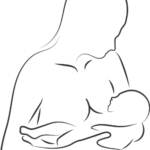Image credit to CK-12 Foundation
1-Week-Old Baby’s Milestones Congratulations! You recently gave birth! There could be a lot of excitement during your baby’s first week of life, but there might also be some uncertainty. There will be growing pains because this child is a first-time parent, which is typical.
Babies of this age adapt to the rhythms of their new environment while eating, sleeping, and being held, according to Pediatrician Natasha Burgert, MD.
It’s normal to have a lot of questions during your newborn’s first week of life. You’ll be concerned about your baby’s poop’s appropriate hue and the number of hours your child should sleep. (Yes, you will unduly take a long time to examine your baby’s diapers.)
At This Age
- Development: While adjusting to their surroundings, your baby will be focusing on learning how to feed themselves properly.
- Sleep: At this age, it’s normal for your baby to sleep for the majority of the day; take advantage of this time.
- Food: During this first week, your baby will be nursing a lot and may have smaller, more frequent meals.
1-Week-Old Baby Development
At one week old, your baby’s primary tasks include acclimating to life outside the womb, learning how to nurse or take a bottle, and receiving lots of cuddles.
Your baby’s responses and motions at this age are primarily involuntary, inborn reflexes. Several reflexes are present in newborns, such as the gripping, “stepping,” “rooting,” and startle reflexes, among others.
Some of them, like the rooting reflex, are visible when you feed your child. When you touch their lips or cheek, they will instinctively dig around for the bottle or breast. When you put your finger or nipple in their mouth, they will begin to suck. Pretty amazing, eh?
Your infant will sleep a lot, on average. All they do is eat and sleep. That is quite typical! Make the most of your downtime by getting a little extra sleep.
1-Week-Old Baby Milestones
At one week old, your kid won’t reach many milestones. Once more, your infant will eat or sleep for the majority of the day, and is essentially a ball of reflexes.
Having said that, you could discover that your baby will look directly at you if you hold them a few inches in front of your face during their brief periods of awareness.
Baby animals as young as one week old can perceive light and dark, particularly the colors black, white, and gray, as explained by Amy Verlsteffen, APRN, senior director of clinical change at TytoCare. Holding the baby in your arms allows them to see objects that are 8 to 12 inches away, according to Verlsteffen.
Your baby will have some reflexive smiles, especially when they’re sleeping, even if their first “real” smile won’t appear for a little time. It won’t happen until your kid is 1 or 2 months old when they smile for the first time in reaction to something you are doing, like playing peek-a-boo or singing.
Additional Behaviors
- Your baby’s head has to be supported and stabilized because they typically lack head control at this age.
- At this age, babies respond very well to touch because it makes them feel secure and warm in the womb.so go ahead and cuddle!
1-Week-Old Baby Feeding
According to Dr. Burgert, feeding is a major worry for parents of one-week-olds. Concerns include whether a newborn can be fed “too much,” how often they should be fed, and whether their child isn’t eating enough.
According to Dr. Burgert, “Many parents have extremely high expectations for a 1-week-old baby.” “It’s critical to keep in mind that, much like parents learning how to feed, babies are learning how to eat.”
Breastfeeding can be difficult at first for many parents, and they may experience difficulties latching or placing their child comfortably at the breast. If your infant isn’t getting enough milk, you might be concerned. Colostrum is a small volume of fluid that you will secrete during the first few days after giving birth, but it is packed with nutrients and immunity for your kid. After birth, you’ll switch to mature milk in three to five days. Usually, you can tell if your baby is receiving enough breastmilk by counting the number of wet and poopy diapers they create each day—roughly 6 wet and 3–4 poopy diapers.
1-Week-Old Baby Sleep
At this age, you should anticipate your kid to sleep a lot, according to Verlsteffen. “Every one to three hours, a one-week-old’s routine consists of eating, sleeping, urinating, crying, and repeating,” the author explains. A newborn that is one week old sleeps 14 to 17 hours per 24 hours on average.
Verlsteffen advises parents to take advantage of the drowsy newborn days and make the most of them to get more sleep. Since your body needs time to recuperate after giving birth, this is especially crucial for parents who have recently given birth.
Safe sleep practices are crucial while caring for a newborn. The American Academy of Pediatrics advises sleeping your child on their back at all times on a stable, clutter-free surface in a secure location like a bassinet or crib.12 No toys, blankets, cushions, bumpers, or loose bedding should be present.
The American Academy of Pediatrics advises against bed sharing but does advise spending the first six months of a baby’s life in your room in a crib, cradle, or bassinet. This makes it easier to feed them at night and enables you to be aware of their requirements.
1-Week-Old Baby Schedule
You’re not alone if you think your child has no schedule at all at this age. This is a typical occurrence. Babies under one week old spend much of the day asleep and are unaware of the distinction between day and night. They have not yet evolved circadian rhythms or melatonin production, which alerts them to slumber when it gets dark outside.
If you find this general lack of structure difficult, that’s typical. For this reason, getting assistance can be crucial.
Also Read : Do Babies Have Kneecaps? Here’s What the Experts Say
1-Week-Old Baby Health and Safety
In the first week of life, your baby will see their pediatrician for the first time for a well-visit. Your infant will be measured and checked. It would help if you took this opportunity to ask any questions you may have regarding development, sleep, or feeding.
Before being released from the hospital, your child will receive the Hepatitis B vaccination. It’s likely that the hospital will verify that your car seat is correctly installed. Make sure your child is securely fastened in this car seat, which should be used for rear-facing passengers.
correctly and isn’t placed adjacent to any windows, cords, hot surfaces, or unrestrained furniture.It is crucial that you refrain from smoking close to your child or from exposing them to secondhand smoke. Smoking raises the possibility of SIDS (sudden infant death syndrome) in your child.
1-Week-Old Baby Care Basics
There are a number of questions that new parents have regarding raising their child. Thankfully, other than food, sleep, and hugs, your baby doesn’t require much at this time. Here are some points to remember.
Umbilical Cord Care
It used to be advised that you use alcohol to wipe the stump of your baby’s umbilical cord. The AAP does not advise that these days. Alternatively, you can just let it heal on its own and wait for it to fall out, which should happen in about a week.
Bathing
It’s advisable to keep your infant out of the water until their umbilical cord has healed.All you need is warm water and very light soap for spot cleaning or sponge washes.
Diaper Changes
Poop color can be used to monitor your baby’s development. Your infant will initially poop black, tarry meconium. Your baby’s excrement will soon turn green before eventually becoming yellow or brown in hue.
You will be doing a lot of pooping. Babies frequently poop after practically every feeding.
What Else to Know About Your 1-Week-Old Baby
As you begin to know your infant, it’s common to feel a bit adrift. Recall that your body is healing and your hormones are altering if you are recuperating from childbirth. You must set aside time to look after your own needs in addition to making sure your child is content and fed. Eat and drink plenty of water.
Big-picture queries like “When am I going to sleep again?” can quickly overwhelm one. You’ll soon discover your rhythm. Enjoy your baby’s beautiful newness and take each day as it comes.










